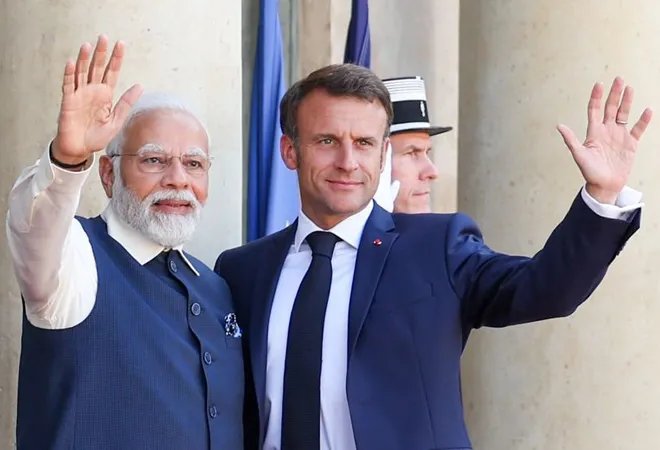-
CENTRES
Progammes & Centres
Location

The recent visit also saw announcements pertaining to the use of UPI in France, and the awarding of five-year-long post-study Schengen visas for Indian students doing a master’s degree in France.The establishment of a ministerial-level defence dialogue in 2018 as well as a strategic space dialogue in 2023 is symptomatic of the tangible strengthening of the bilateral relationship, shaped by a larger rapprochement, resulting from deep convergences in the Indo-Pacific region. These convergences are not only political (regarding China) and conceptual (a shared ambition of strategic autonomy, a belief in a multipolar world shaped by reformed and effective multilateralism), but, at its foundation, geographical. While the Indo-Pacific stops at New Zealand for Germany and starts on the western shores of India for the US and Australia, India and France share an extensive definition of the concept, from the East coast of Africa to the West coast of the Americas. This common understanding of the geographical contours of the Indo-Pacific is not insignificant. It encourages – through a shared understanding of its geography and de facto stakeholders – the establishment of multi-dimensional bilateral cooperation projects in various areas such as counter terrorism, piracy, organised crime, illegal fishing, and environmental security. This is particularly the case for maritime security and naval cooperation, which has emerged as one of the most promising domains of cooperation between the two countries in recent years. The joint exercise Varuna organised between the two navies since 1993 led to joint patrols in the Indian Ocean, the first of which was held in 2019 in the Southern Indian Ocean, with the deployment by the Indian Navy of P-81 aircraft from La Réunion. A second patrol was held in May 2022, four years after a logistics support agreement was inked in March 2018, giving the Indian Navy access to the military base of La Réunion. Beyond naval cooperation, the rising importance of maritime security also took shape through the India-led Indo-Pacific Oceans Initiative (IPOI) launched in November 2019, in which Paris held the responsibility of one of the seven pillars (marine resources). More significantly, in February 2022, the two countries signed a road map on the blue economy and ocean governance, aiming at setting up a multi-sectoral partnership around a common vision of ocean governance based on the rule of law, sustainable growth, infrastructure and science and technology.
The launching of the International Solar Alliance by the two countries in November 2015 was already an example of the emerging globalisation of a relationship that was, until then, primarily bilateral.If these developments underscore the commitment of India and France to joint collaboration on regional issues of concern, the relationship is moving from purely bilateral to regional and global in nature. The launching of the International Solar Alliance by the two countries in November 2015 was already an example of the emerging globalisation of a relationship that was, until then, primarily bilateral. The 2022 call for an Indo-Pacific Parks Partnership to provide regional capacity-building for sustainable management of protected areas was also a step in that direction. At the Indo-Pacific level, while the second pillar of the just-released road map to 2047 aims to provide concrete solutions to make the Indo-Pacific a region of stability and sustainable development, multilateral mechanisms where both France and India participate – such as the Indian Ocean Rim Association (IORA) and the Indian Ocean Naval Symposium (IONS) – offer ideal platforms through which the two countries can jointly contribute to regional security. The same approach must now configure existing trilateral formats between the two countries (India-France-Australia since 2020 and the newly established India-France-UAE) and guide the creation of other platforms with like-minded nations. The Indo-French road map for the Indo-Pacific inked during Modi’s visit in Paris will need to turn ambitions into deliverable concrete outcomes for the region as a whole. Modi’s visit has charted an ambitious course for India and France for the next few decades. It is befitting a relationship that has been very effective in constantly configuring itself to the realities of an ever-evolving international milieu. It is the operationalisation of this agenda that will now demand serious attention of the policymakers, both in Paris and New Delhi.
The views expressed above belong to the author(s). ORF research and analyses now available on Telegram! Click here to access our curated content — blogs, longforms and interviews.

Professor Harsh V. Pant is Vice President – Studies and Foreign Policy at Observer Research Foundation, New Delhi. He is a Professor of International Relations ...
Read More +